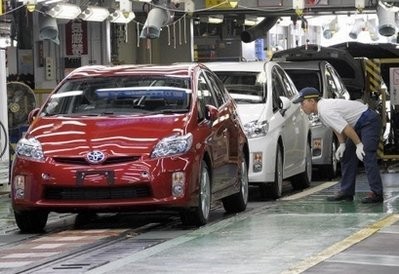US pressure on Toyota over safety problems may underscore genuine government concerns about the Japanese automaker but also reflects American protectionist tendencies, according to some analysts.

President Barack Obama's administration has kept foreign firms out of projects in its multi-billion dollar stimulus package and stepped up penalties on competitive Chinese products for alleged dumping or "unfair" subsidies.
Accusations it is trying to capitalize on Toyota's blunders to protect the local automobile industry could stem largely from the fact that the government owns major stakes in key US rivals General Motors (GM) and Chrysler.
"There does seem to be an unusually heavy amount of attention paid by the administration to the Toyota recalls, considering that recalls in this industry are extraordinarily common," economist Daniel Ikenson at the libertarian Cato Institute in Washington told AFP.
This may be due to "the fact that bad news for Toyota benefits the nationalized GM -- and in that sense, it is tied to protectionist sentiment," said Ikenson, associate director at Cato's center for trade policy studies.
"One cannot objectively referee a race in which it has its own horse," he said.
The US pressure may also be due to "the equally unpleasant fact that policymakers would rather be seen tackling a problem they can manage -- and thus score points in the polls -- than dealing with the real problems they were elected to fix, like our wayward finances," Ikenson said.
Obama is facing a variety of problems -- from double digit unemployment to a soaring national debt -- as the country recovers from a brutal recession ahead of key congressional polls at the end of the year.
US officials and lawmakers are planning to haul in Toyota officials, including embattled boss Akio Toyoda, to explain the massive recall and answer accusations they were slow to respond to the accelerator and brake problems.
Obama's transport chief Ray LaHood panicked markets last week when he told a congressional panel that owners of millions of Toyota vehicles affected by accelerator defects should "stop driving" them.
He later toned down the remark but insisted safety officials, "will continue to hold Toyota's feet to the fire to make sure that they are doing everything they have promised to make their vehicles safe."
Some US business groups have cautioned the authorities and Congress against carrying the campaign against Toyota too far, reminding them that the world's biggest car manufacturer has pumped 16 billion dollars of investments into the American economy and is a major employer of American workers.
Citing murmurs in Tokyo about a new round of Japan-bashing brewing in the US, the Investor's Business Daily, a US publication, said, "Given the anti-business and protectionist atmosphere in Washington right now, that's not a surprise.
"In this case, a government that owns two US car companies and claims to impartially regulate all of them is sending a clear warning shot across the bow of foreign companies," it said in an editorial.
"That's an insane thing to do with the US economy tanking, deficits soaring and unemployment at 9.7 percent. Foreign investment will help solve all of these problems."
The governors of the US states of Indiana, Kentucky, Mississippi and Indiana wrote a letter Wednesday to lawmakers planning to quiz Toyota officials urging them to consider the Japanese company's "long history as a steward of safety (and) as a valued employer across the nation."
Toyota employed 172,000 company and dealership staff across the United States, not including suppliers, they said, criticizing "disturbing statements and hasty actions" on the company by government officials.
Edmunds.com, a US car shopping website, said Toyota ranked 17th in the overall number of complaints per vehicles sold from 2001 through February 3 of this year.
It found Toyota ranked below General Motors. Chrysler and Ford as well as Honda, Nissan and Hyundai in the overall number of complaints per market share.
"No one should overlook the issues raised by the Toyota recalls, but it is important to keep things in perspective," reminded Edmunds.com chief executive Jeremy Anwyl.







)
















